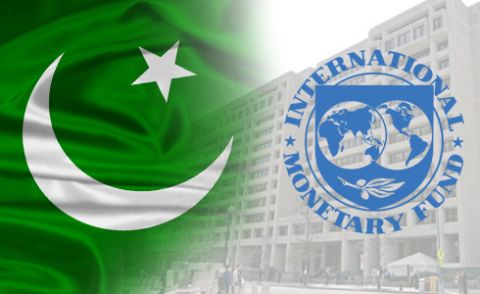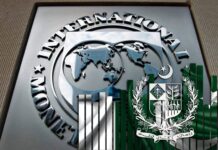
LAHORE: The International Monetary Fund on Tuesday released its policy statement regarding first Post-Program Monitoring Discussions with Pakistan and maintained a favourable near-term outlook for economic growth.
The IMF statement published on its website said it expected the real GDP to grow by 5.6 per cent in FY 2017-18, propelled by improvements in the power supply, investments linked to China-Pakistan Economic Corridor (CPEC), robust rise in consumption growth and agriculture recovery which is underway, and inflation remained under control.
But the IMF cautioned continuous abrasion of macroeconomic resilience could put its outlook at risk due to major fiscal slippages in 2017 and predicted fiscal deficit to touch 5.5 per cent of GDP this year.
It highlighted the spike in imports contributed to a widening trade deficit and a major dent in international reserves considering the higher external financing.
The Washington-based lender predicted current account deficit for FY 2017-18 could touch 4.8 per cent of the GDP, due to a sharp decline of gross international reserves in lieu of limited exchange rate flexibility.
IMF warned taking into context the increase in external and fiscal financing needs, dwindling reserves, risks to” Pakistan’s medium-term capacity to repay the Fund have increased since completion of the Extended Fund Facility (EFF) arrangement in September 2016.”
On the other hand, the IMF’s executive board assessment observed the favourable growth momentum of Pakistan but highlighted the worsening macroeconomic indicators, which included a widening of fiscal and external imbalances and decreasing forex reserves.
It added these increased risks to the country’s financial and economic outlook and its ability to sustain debt in the medium-term. The board advised the authorities to address this issue and pivot their near-term policies to safeguard macroeconomic stability.
The decision of State Bank of Pakistan (SBP) to permit Pakistani rupee to depreciate against the dollar in early-December 2017 was appreciated by the executive board but emphasised on the significance of greater exchange rate flexibility on a more permanent basis to enhance competitiveness and safeguard external buffers.
The executive board urged the relevant authorities “to phase out administrative measures aimed at supporting the balance of payments as soon as conditions allow to minimize potential economic distortions,” read the statement.
Also, the directors observed the external sector pressures were related to fiscal decline during last financial year and due to complaisant monetary policy stance, followed by high imports because of CPEC projects.
IMF’s executive board urged the government to focus on bolstering fiscal discipline via additional revenue measures and constrain current expenditure while safeguarding pro-poor spending.
It backed the recent move to hike policy interest rate by the central bank and said further monetary tightening would be paramount to address risks associated with inflation and combat external imbalances.
Furthermore, the directors stressed on the need of sensible debt management and warned of bringing in new external liabilities. It urged the authorities to address the issue of risks emanating from continuing losses in public-sector enterprises (PSEs).
The IMF’s executive board said, “Directors underscored the importance of accelerating structural reforms to reinforce macroeconomic stability, raise competitiveness, and promote higher and more inclusive growth.”
They also highlighted the “need to strengthen the fiscal federalism, monetary and financial policy frameworks; further, enhance the AML/CFT regime; improve the business climate; continue to strengthen governance; achieve cost‑recovery in the energy sector; and expand social safety nets to protect the most vulnerable.”






